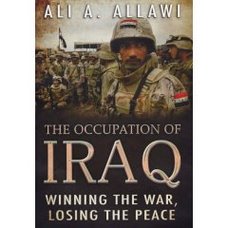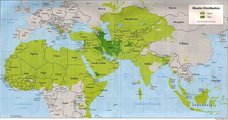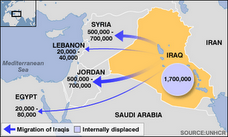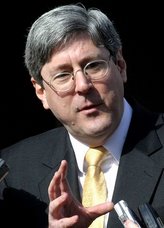
 . . . . . . . .http://www.cbsnews.com/sections/i_video/main500251.shtml?id=2739654n (WATCH IT)
. . . . . . . .http://www.cbsnews.com/sections/i_video/main500251.shtml?id=2739654n (WATCH IT)Tenet opens with a scene that was to turn out prescient. As he entered the West Wing at 7:30 a.m. on Sept. 12, 2001, he writes, he encountered Richard Perle, chairman of the president’s Defense Policy Board Advisory Committee.
“Iraq has to pay a price for what happened yesterday. They bear responsibility,” Tenet quotes Perle as saying.
As Tenet tells it, the CIA spent great amounts of energy and time trying — futilely, as it would turn out — to rein in the determination of Vice President Dick Cheney, Deputy Defense Secretary Paul Wolfowitz and others to use the Sept. 11 attacks to justify removing Saddam from power, which they had failed to do during the Persian Gulf War of 1991.
As early as Bush’s first meeting at Camp David with his top advisers on the weekend after the attacks, Wolfowitz “was fixated on the question of including Saddam in any U.S. responses,” Tenet writes.
Thereafter, the National Security Council staff held regular meetings on Iraq in which discussion proceeded on the assumption that Saddam would be ousted. The confidence in that outcome was so high that sometimes, debate centered on details like whose portrait would be put on the country’s new currency, Tenet says.
“I didn’t pay enough attention to the gathering storm,” Tenet writes, blaming himself for not having done enough to stem the tide of sentiment to take out Saddam whatever the justification.
Bush is depicted as having been steamrollered by more ideological members of his administration. At one NSC meeting, Bush’s questions and body language led Tenet to conclude that “the President seemed less inclined to go war than many of his senior aides!”
Tenet reserves his harshest words for Cheney, who comes across as Machiavellian, ideological and surrounded by a coterie of overly self-confident advisers. But Tenet offers unflattering assessments of numerous other top Bush aides, as well.
Secretary of State Condoleezza Rice, then the national security adviser, is painted as insecure and almost naive in some sections. At times, she strikes Tenet as incompetent; at others, she appears duplicitous. Overall, she is depicted as never being quite up to the task. Rice’s deputy at the time, Stephen Hadley, is portrayed as a mirror of his boss, but with an extra gloss of arrogance.
Douglas Feith, the undersecretary of defense for policy, comes in for a scorching review. To Tenet, no one else in the administration was so captive to the core beliefs of Wolfowitz and other neoconservative thinkers as Feith, to such an extent that he refused to brook any alternative interpretation of events.
And in characterizations certain to rankle some quarters of the administration, particularly the Defense Department, Tenet casts former Defense Secretary Donald Rumsfeld’s rival, former Secretary of State Colin Powell, as sharing Tenet’s principled doubts about the strategy for war.
“Iraq has to pay a price for what happened yesterday. They bear responsibility,” Tenet quotes Perle as saying.
As Tenet tells it, the CIA spent great amounts of energy and time trying — futilely, as it would turn out — to rein in the determination of Vice President Dick Cheney, Deputy Defense Secretary Paul Wolfowitz and others to use the Sept. 11 attacks to justify removing Saddam from power, which they had failed to do during the Persian Gulf War of 1991.
As early as Bush’s first meeting at Camp David with his top advisers on the weekend after the attacks, Wolfowitz “was fixated on the question of including Saddam in any U.S. responses,” Tenet writes.
Thereafter, the National Security Council staff held regular meetings on Iraq in which discussion proceeded on the assumption that Saddam would be ousted. The confidence in that outcome was so high that sometimes, debate centered on details like whose portrait would be put on the country’s new currency, Tenet says.
“I didn’t pay enough attention to the gathering storm,” Tenet writes, blaming himself for not having done enough to stem the tide of sentiment to take out Saddam whatever the justification.
Bush is depicted as having been steamrollered by more ideological members of his administration. At one NSC meeting, Bush’s questions and body language led Tenet to conclude that “the President seemed less inclined to go war than many of his senior aides!”
Tenet reserves his harshest words for Cheney, who comes across as Machiavellian, ideological and surrounded by a coterie of overly self-confident advisers. But Tenet offers unflattering assessments of numerous other top Bush aides, as well.
Secretary of State Condoleezza Rice, then the national security adviser, is painted as insecure and almost naive in some sections. At times, she strikes Tenet as incompetent; at others, she appears duplicitous. Overall, she is depicted as never being quite up to the task. Rice’s deputy at the time, Stephen Hadley, is portrayed as a mirror of his boss, but with an extra gloss of arrogance.
Douglas Feith, the undersecretary of defense for policy, comes in for a scorching review. To Tenet, no one else in the administration was so captive to the core beliefs of Wolfowitz and other neoconservative thinkers as Feith, to such an extent that he refused to brook any alternative interpretation of events.
And in characterizations certain to rankle some quarters of the administration, particularly the Defense Department, Tenet casts former Defense Secretary Donald Rumsfeld’s rival, former Secretary of State Colin Powell, as sharing Tenet’s principled doubts about the strategy for war.




























